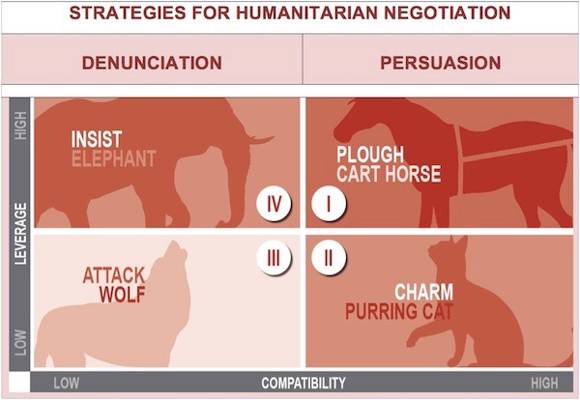
Negotiating access to vulnerable populations is a core element in humanitarian action, and essentializes the question of how to maintain the humanitarian principles of humanity, neutrality, impartiality and independence in conflict settings. Humanitarian negotiations may take different forms, from principled agreements made in government offices to pragmatic deals in the field. Humanitarian organizations negotiate with host states, rebel groups, local authorities, beneficiaries, intervening states, international organizations and donors among others.
Humanitarian negotiations involve several kinds of dilemmas, including the following:
- Insisting on neutrality, impartiality and/or independence when conflicting with offers for political or economic support
- Non-disclosure as a premise for access when negotiating with host-states
- Striking deals with armed actors that act in persistent violation of International Humanitarian Law
Dealing with these dilemmas require a clear understanding of how the humanitarian principles should be interpreted in concrete situations. When doing so, different factors play in, such as:
- The type and level of conflict, or political tension
- Local knowledge, and ability of humanitarian actors to build trust vs. being seen as useful by external parties
- Diversity: the identity of the negotiating parties and beneficiaries, including gender, class and ethnicities
Gender is a central dimension to be considered in humanitarian negotiations – both when it comes to the gender of the negotiators, but also when it comes to the programming of operations. Should humanitarian organizations insist on gender neutrality when it comes to staff involved in humanitarian negotiations, or should they adjust strategically to the contexts of the negotiations? And should humanitarian organizations insist on gender equality regarding the beneficiaries of aid? Should women be treated differently than men, adjusting to local customs, or should all recipients be treated equally along the human rights standards of secular liberal democracies?
Responding to many of these dilemmas and challenges raised, the Centre of Competence on Humanitarian Negotiations (CCHN), was established by the ICRC, MSF, UNHCR, WFP and the Centre for Humanitarian Dialogue (HD), with the belief that humanitarian professionals have the necessary experience to reflect collectively on these issues and share their lessons learned across the humanitarian system.
As a result, the CCHN Field Manual on Frontline Humanitarian Negotiation, published in December 2018, proposes a comprehensive method to conduct humanitarian negotiation in a systematic and organized manner.
It seeks to provide tools allowing humanitarian organizations to:
- Engage in proper and informed context analyses
- Build trust among counterparts, understand their perspectives and reach out to their motives and values
- Leverage the organizations' missions, and international norms
- Elaborate robust and implementable arrangements under clearly defined mandates, with adequate red lines
As an introduction to the topic of humanitarian negotiations, Claude Bruderlein, Director of the Centre of Competence on Humanitarian Negotiations, will present the work behind the elaboration of the CCHN Field Manual. This will be followed by a discussion among the participants, including humanitarian actors, policy makers and researchers.
This seminar is on inivitation only, and will apply Chatham House rules to the discussion.
It is organized as part of the kick-off for the new Research network on Humanitarian efforts, hosted by the Norwegian Centre for Humanitarian Studies.





